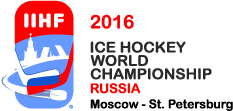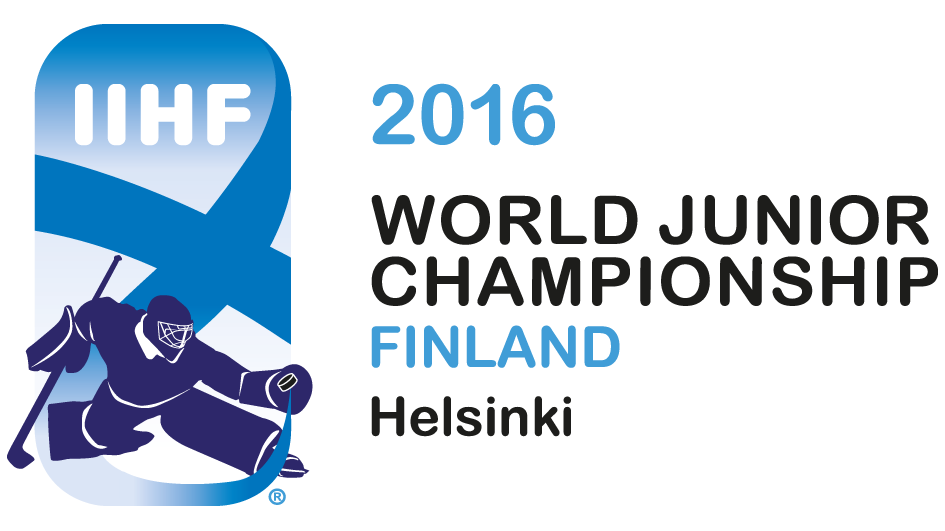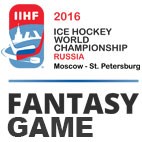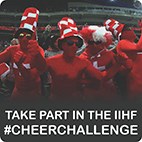Voice of experience
Voice of experience
Hamhuis shares insights on rivalry with Russia

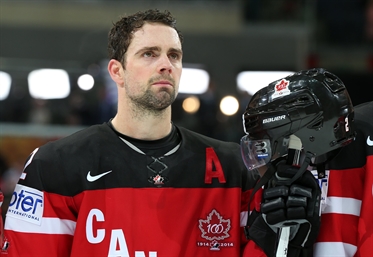 Canada's Dan Hamhuis enjoyed beating archrival Russia in a gold medal game for the first time in his career at the 2015 Worlds. Photo: Andre Ringuette / HHOF-IIHF Images
Canada's Dan Hamhuis enjoyed beating archrival Russia in a gold medal game for the first time in his career at the 2015 Worlds. Photo: Andre Ringuette / HHOF-IIHF Images
As a classy, skilled representative of Canada, Russia’s ultimate hockey archrival, he brings a distinctive perspective on the nation that will host the 2016 IIHF Ice Hockey World Championship (6-22 May in Moscow and St. Petersburg).
It’s been quite a journey. Hamhuis, an alternate captain with the Vancouver Canucks, earned bronze with Canada in his World Junior debut as an 18-year-old in 2001 in Moscow. Most recently, in 2015, he suited up for the powerhouse Canadian team that hammered Russia 6-1 in the World Championship gold medal game in Prague.
And there were a lot of ups and down in between for the Smithers, British Columbia native in his battles with the Russians.
“With two really good hockey nations, you meet each other a lot in the medal round,” Hamhuis said. “For instance, three times in the World Championships I’ve faced them in the gold medal game. Two losses and a win. It’s certainly been impactful on my career.”
Hamhuis, 33, already has a lifetime’s worth of experiences to relive.
For a church-going boy from a small town in Western Canada, there was an element of culture shock during his inaugural visit to the Russian capital in 2001.
“It was very different,” he recalled. “It was a little scary on the streets. Certainly they’re big hockey fans there, but walking around there, you saw soldiers walking around with guns and stuff. It was a little scary. I remember the food wasn’t my favourite either. It was a bit tough eating. I remember getting sick there my first year and losing a lot of weight.”
After that bronze medal run, Hamhuis was left with another bitter taste in his mouth at the 2002 World Juniors in the Czech Republic. Russia scored a 5-4 comeback victory over Canada in the gold medal game on Anton Volchenkov’s third-period winner.
After finishing fourth at the 2006 World Championship in Latvia, Hamhuis – then a member of the Nashville Predators, who drafted him 12th overall in 2001– finally tasted gold the following year in Moscow. It was the start of Steve Yzerman’s glorious tenure as Team Canada’s general manager.
Under the legendary former Detroit Red Wings captain, the Canadians earned nine consecutive wins. They beat Finland 4-2 in the final, best-remembered for tournament MVP Rick Nash’s spectacular individual effort on the game’s last goal.
However, when Hamhuis looks back, he thinks first about the savvy bench boss who also led Canada to gold at the 1997 and 2003 Worlds and coached the St. Louis Blues and Los Angeles Kings.
“Andy Murray was our coach. He was good. Sometimes, for a World Championship coach, I think, it’s hard to be hard on players. It’s such a short-term tournament with all new players. But he was tough on us. He certainly pushed us. I think that’s what took us to the level we needed to be at to win that tournament.”
One of the NHL’s biggest future stars was a role player on that Canadian team – without ever having worn an NHL jersey yet. Jonathan Toews, who’d go on to win two Olympic gold medals and three Stanley Cups as the captain of the Chicago Blackhawks, turned 19 at that tournament. The University of North Dakota centre, later dubbed “Captain Serious,” finished with two goals and five assists. He made an impression on his teammates.
“He was very young at that time,” Hamhuis said. “He played in the World Juniors that year as well. So we knew him from there and his exciting clutch performance in that shootout against the Americans. For us, he didn’t have a huge role on the team at that time. But you could see he was a very focused individual. You never know where a young player is going to go at that time. But he had all the right things going for him, the right mindset and the right personality.”
Hamhuis had to muster all of his own mental toughness to bounce back from two heart-breaking losses to Russia in the next two IIHF World Championship finals.
In 2008 in Quebec City, Canada went up 4-2, but wound up falling 5-4 on Ilya Kovalchuk’s OT winner on the power play. It wasn’t the way the hosts wanted to mark the IIHF’s centennial year. The following year in Berne, Switzerland, quirky goalie Ilya Bryzgalov stole the show, making 37 saves as Russia won 2-1.
“I felt we should have won all those gold medal games, and that’s what really made it hard,” Hamhuis said. “In Quebec City, we gave up a big third-period lead to lose to them. And then in Switzerland, I thought we outplayed them but lost. So those were all tough defeats.”
The biggest victory of his life would come five years later at the 2014 Olympics in Sochi. Canada played air-tight defence en route to its second straight Winter Games title.
While Hamhuis averaged just over four minutes of ice time a night in the five games he played, he wasn’t complaining about getting the chance to help out superstar netminder Carey Price as Canada blanked Sweden 3-0 in the final. Literally and metaphorically, the sun shone at the Bolshoy Ice Dome.
“It was certainly a bubble down there,” said Hamhuis. “It was beautiful. You wouldn’t know if you were in Las Vegas or in Russia. That area of the country was gorgeous. The Russians did such a nice job of putting that together. They put the stadiums all together in one place. Logistically, it was so well-organized for everybody. It was a lot of fun and we had a really great team there. From the team that had been together and had success in Vancouver, so many of those guys were back in 2014. They knew what to expect from Mike Babcock. He had very high expectations for our team and pushed us hard too. I think the success came from everyone dropping their egos at the door and buying into the team concept. We had a really strong tournament.”
Hamhuis got to play a bigger role at the 2015 Worlds, and said it was worth the long wait to defeat Russia in a final for the first time in his career.
“It was real satisfying to be able to finally beat them – and handily – in 2015 at the World Championship,” he said. “To do it with a guy like Jason Spezza, who I played on some of those other teams with...we both went through those losses together, and to win together was pretty special.”
While Hamhuis is accustomed to facing one or two Russian stars on any given night in the NHL, it’s a different challenge playing the national team at the IIHF Ice Hockey World Championship. What tips would he give to other defencemen who might face Canada’s archrival in Moscow this year?
“When you’ve got a whole team full of Russians, they’re so dynamic and so skilled, it’s really hard to defend against them. You need to be fully focused all the time – both with your individual game, to play those one-on-ones, and as a team. It’s different with the big ice over there. It’s easier for forwards to get lost in the neutral zone and then pop out of little spots with speed. As a defenceman, it’s hard to control that. You have to be very aware of what’s going on around you.”
Take it from someone who knows.
Back to Overview

